|
About - AMSA Year in Review - 2001-2002 - Water
Infrastructure Funding Gains National Prominence
 Last year’s Year in Review article on
the Association’s water infrastructure funding initiative reads
“AMSA Builds Momentum for Water-21.” Since then, momentum has
continued to gather for wastewater infrastructure funding,
culminating in the introduction this year by the House and Senate of
two bills. While both the House and Senate infrastructure bills
would raise the authorization levels for the clean water state
revolving fund (SRF) to $20 billion over five years, the Senate
version contains many unnecessary and unacceptable regulatory
provisions, which would serve only to deter wastewater utilities
from applying for these funds. The House bill, however, is more
flexible than its Senate counterpart and would also provide
significant grant funding for wet weather projects, which the Senate
bill fails to include. Last year’s Year in Review article on
the Association’s water infrastructure funding initiative reads
“AMSA Builds Momentum for Water-21.” Since then, momentum has
continued to gather for wastewater infrastructure funding,
culminating in the introduction this year by the House and Senate of
two bills. While both the House and Senate infrastructure bills
would raise the authorization levels for the clean water state
revolving fund (SRF) to $20 billion over five years, the Senate
version contains many unnecessary and unacceptable regulatory
provisions, which would serve only to deter wastewater utilities
from applying for these funds. The House bill, however, is more
flexible than its Senate counterpart and would also provide
significant grant funding for wet weather projects, which the Senate
bill fails to include.
 The introduction of these
infrastructure bills marks an important step toward the ultimate
goal of getting Congress to recognize and act upon the clear need
for an enduring federal presence in the wastewater infrastructure
arena. Indeed, over this past year, the U.S. Environmental
Protection Agency (EPA), the Government Accounting Office, and other
federal agencies have all recognized the need for an increased
federal role to overcome a funding shortfall that has been estimated
to be as large as $1 trillion over the next 20 years. The introduction of these
infrastructure bills marks an important step toward the ultimate
goal of getting Congress to recognize and act upon the clear need
for an enduring federal presence in the wastewater infrastructure
arena. Indeed, over this past year, the U.S. Environmental
Protection Agency (EPA), the Government Accounting Office, and other
federal agencies have all recognized the need for an increased
federal role to overcome a funding shortfall that has been estimated
to be as large as $1 trillion over the next 20 years.
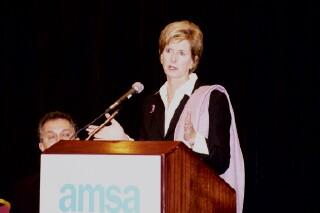
Christine Todd
Whitman, Administrator of the U.S. Environmental Protection Agency,
spoke at AMSA’s 2002 National Environmental Policy Forum in
Washington, D.C., calling water quality the single greatest
environmental challenge of the 21st century. Governor Whitman
expressed appreciation for the work AMSA has done to raise awareness
of the tremendous challenges posed by wastewater infrastructure and
security funding needs.
Legislative and Grassroots Efforts
Raise Awareness of Infrastructure Needs
AMSA has
been focused on obtaining significant wastewater infrastructure
funding from Congress over this past year, waging a legislative
campaign on behalf of wastewater infrastructure funding that has
included raising its lobbying presence on Capitol Hill, especially
with the key Environment and Public Works and House Transportation
and Infrastructure Committees. Additionally, between May 2001, and
September 2002, AMSA members testified before Congress multiple
times, attesting to the enormous municipal need for federal
wastewater infrastructure funds.
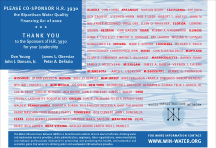 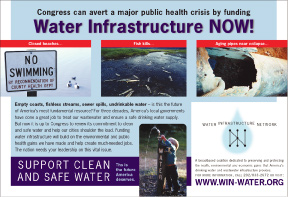
These two WIN ads
appeared in Congress' Roll Call publication in 2001,
2002
AMSA’s grassroots effort on wastewater infrastructure funding, in
conjunction with the Water Infrastructure Network (WIN) Public
Relations Subcommittee, dramatically increased attention on the
infrastructure issue in the national press, with over 100 articles
published in the national press, including The Wall Street Journal,
Chicago Tribune, Los Angeles Times, The Washington Post, and others.
AMSA’s members also played a key role in signing onto and placing
editorials in their local press calling on Congress to act on the
wastewater infrastructure funding shortfall. WIN also implemented an
advertising strategy, which included two timely ad placements in
Roll Call, Congress’ most widely read newspaper, calling for the
passage of meaningful, long-term water infrastructure
legislation.
House Committee Approves Wastewater
Funding Bill
In March, the House Transportation
and Infrastructure (T&I) Committee introduced and unanimously
reported the Water Quality Financing Act of 2002 (H.R. 3930). AMSA
has supported the bill which would authorize $20 billion over five
years for the Clean Water State Revolving Loan Fund, would provide
over $1 billion in grants to municipalities for sewer overflow
control projects and does not saddle municipalities seeking funds
with overly burdensome regulatory requirements. Despite EPA
Administrator Whitman’s comments that water infrastructure is among
the nation’s top environmental priorities, the White House has
expressed firm opposition to the $20 billion funding level in the
bill, stating that the authorization levels are not in keeping with
the President's current budget priorities, especially homeland
security.
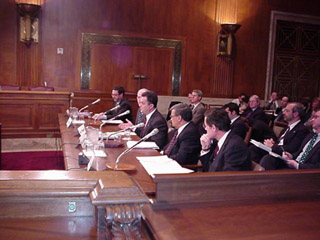
Paul Pinault,
Executive Director of the Narragansett Bay Commission in Providence,
Rhode Island and AMSA’s then Vice President testifies before the
Senate Subcommittee on Fisheries, Wildlife and Water on behalf of
AMSA. Pinault thanked the Senators for introducing the Water
Investment Act of 2002 (S. 1961), making it clear, however, that
AMSA would be seeking key modifications to the bill.
Senate Moves Water/ Wastewater
Infrastructure Funding Bill
The Senate
Environment and Public Works (EPW) Committee’s combined water and
wastewater infrastructure funding bill, the Water Investment Act of
2002 (S. 1961) amends the funding provisions of the Clean Water and
Safe Drinking Water Act to provide $20 billion over five years to
the clean water state revolving fund and $15 billion to the drinking
water state revolving loan fund. S. 1961 would also end federal
funding after the five year period, and would place additional
burdens on loan applicants to obtain funding.
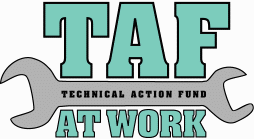
Recent efforts by the Senate Democratic leadership to move S.1961
on a fast track met with significant opposition from their own party
over the funding formula used to calculate the amount of money each
state receives for its clean water loan fund and Davis-Bacon Act
provisions that ensure prevailing wage requirements are part of S.
1961. Several Senators have also raised the concerns with S. 1961
that AMSA and other key municipal and state organizations have
raised, including provisions that would give state oversight
authority over local rate-setting; unreasonable noncompliance
provisions that would only deter applicants from seeking the funds;
and putting states in the untenable position of acting as legal
counsel, financial planner, management consultant and quality
controller for virtually every wastewater utility seeking funds.
|

